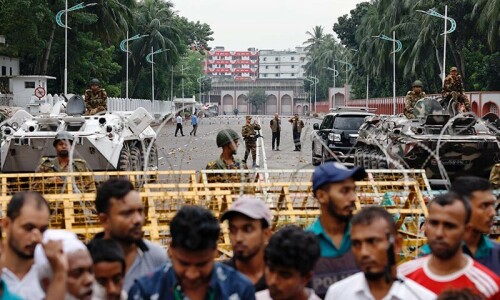PAKISTAN’S coronavirus figures are becoming more worrying with each passing day. The graph depicting confirmed cases is at a sharper incline as compared with previous weeks. The daily death rate, too, is increasing, with 16 Covid-19-related fatalities reported across the country on Sunday alone. There is little doubt that the government understands the scale of the problem. From the prime minister and his key health adviser to senior officials, most are well aware that the coronavirus threat is growing in the country and have expressed this apprehension at several public forums. Additionally, health officials have sounded the alarm about the number of asymptomatic individuals testing positive. Yet, despite the writing on the wall and clear indications that the situation will soon become very difficult, the government’s approach remains unassertive. Lockdown measures in most cities have been eased. In some areas, the scenes at bazaars and in mosques are reminiscent of any other day in the pre-Covid-19 era. Overall, the atmosphere of urgency and caution which was palpable in the initial lockdown days is dissipating. The scenario raises a serious question: what is the government’s strategy?
Prime Minister Imran Khan has been against any iteration of a lockdown from the very first day. The premier has unequivocally said that the country cannot afford to lock down due to dire economic consequences and has appealed to citizens to be responsible in practising distancing measures. Yet, even when it came to congregational prayers in Ramazan — which have little connection with the economic situation — Mr Khan said: “We knew that people will definitely go to the mosques even after the government stops them by force.” A similar rationale was applied by President Arif Alvi, when he met members of the clergy and formulated distancing SOPs for congregational prayers. Unfortunately, this appeal has been largely unsuccessful. A survey has revealed that 80pc of mosques in Punjab and the federal capital are not implementing the agreement reached between the government and ulema. Observers conducting the survey noted that worshippers in 194 mosques violated preventive measures.
The experiment has failed and begs a reassessment. For the government to rely on the notion of individual citizen responsibility, it must confront an unfortunate reality: the Swedish model of self-regulation, if successful, is only possible because it relies on the notion of trust between citizens and state — a historical rarity in Pakistan and in many other countries. The crowds in public spaces are evidence that the government’s appeals have not been taken seriously. Therefore, the government must rethink its strategy and impose stringent restrictions even as it ramps up testing to the promised 25,000 a day — a target it is yet to meet. The approach of ‘advice giving’ must be abandoned. Instead, the government ought to exercise its constitutional authority to protect the public before it is too late.
Published in Dawn, April 28th, 2020











































